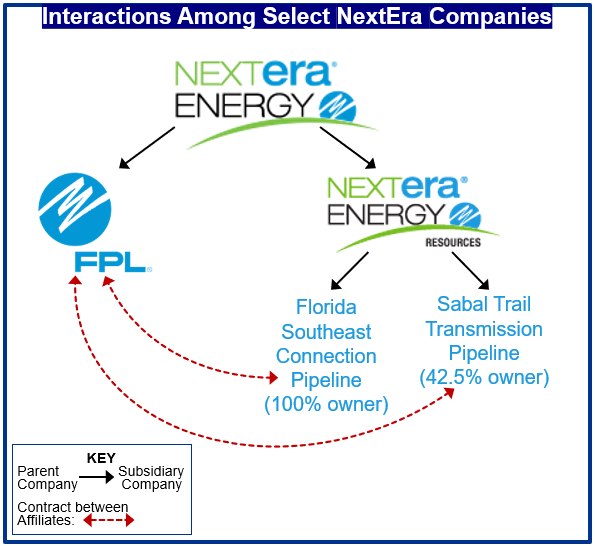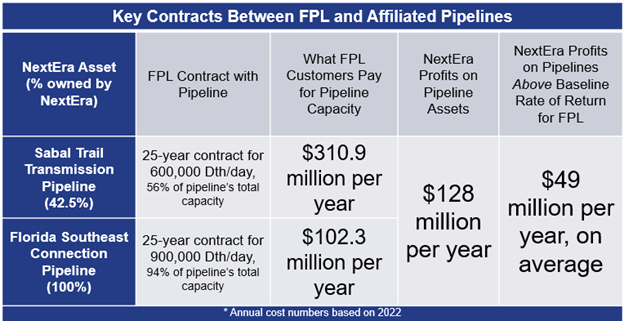Florida should protect utility customers from rates that yield excess profits for affiliated companies
Florida is overwhelmingly dependent on natural gas imported from out of state to generate 75% of its power for customers like homes and businesses. Unfortunately, a loophole in fuel cost recovery policy creates financial incentives for outsized natural gas dependence, funded by Florida families and businesses through rates and Florida lacks a comprehensive process for integrated resource planning, instead typically deferring to 10-year plans filed by utilities, with no requirements to diversify energy sources.
The state’s largest utility, Florida Power & Light, supports a growing network of natural gas infrastructure, in part through contracts with affiliated companies. These types of agreements come with a risk of decreased competition. New analysis shows that customers’ monthly bills are helping provide profits to FPL parent company NextEra at rates of return higher than Florida allows utilities to recover via contracts between FPL and NextEra-owned pipelines. Florida lawmakers and regulators should act to ensure that customers are protected.
Florida should protect utility customers from rates that yield excess profits for affiliated companies Share on XCaution is needed when affiliated companies make deals
To ensure adequate supply, electric utilities contract with natural gas pipeline developers for daily deliveries of natural gas to power plants, and state regulators allow utilities to recover these costs from customers in a fuel cost recovery charge.
Usually, these supply contracts between pipelines and utilities are negotiated at arms-length and driven by the markets. Pipelines are built when there is enough demand to support them, and utilities are motivated to seek the best price for gas and pipeline transportation.
But FPL has contracts with two major gas pipelines owned by its own parent company, NextEra Energy. One is the Florida Southeast Connection pipeline that is fully owned by NextEra, where FPL has contracted for 94% of the pipeline’s capacity.
Affiliate dealings can reduce competition in the market, as the affiliated entities may not have the same incentive to compete with each other. Lack of competition can lead to guaranteed profits for shareholders at the expense of higher prices for consumers, as there may be less pressure to offer competitive rates or improve services. And affiliate-backed projects can result in overbuilding pipeline capacity, since profits are driving projects rather than genuine market need.
Utility customers help fund extra NextEra profits
In recent years, FPL signed 25-year contracts with both the Sabal Trail Transmission pipeline and the Florida Southeast Connection pipeline. FPL, Sabal Trail, and Florida Southeast are all owned entirely or partly by NextEra Energy Inc. FPL contributed 62% of NextEra’s $7.31 billion in net income in 2023, thanks in part to Florida ratepayers who are on the hook for the majority of gas capacity and associated costs from NextEra’s pipeline assets.
As a regulated utility, FPL’s rate of return is capped between 9.7 to 11.7% by the Florida Public Service Commission per its last rate case. But thanks to contracts between FPL and NextEra’s subsidiaries, FPL customers support a higher rate of return — and thus greater profits — for the pipeline companies. NextEra makes $128 million in annual profit, an approximately 13% return on investment, from its pipeline subsidiaries — funds collected mostly from FPL customers.
Furthermore, over 97% of FPL’s contractual payments to the Sabal Trail and Florida Southeast pipelines do not vary by usage. Thus, even if gas demand declined and FPL reduced its usage of the pipeline capacity in a given year, FPL and its customers would still be paying almost the same amount to the NextEra affiliated companies.
What Florida can do to protect ratepayers
The Florida Public Service Commission has the responsibility to protect ratepayers from unreasonable or imprudent investments by utilities.
State regulators should formally recognize that affiliate transactions require heightened scrutiny, to ensure that customers are not subsidizing unneeded infrastructure or being overcharged.
- Existing Florida standards are supposed to ensure that affiliate “transactions and activities are not subsidized by utility ratepayers,” but the rules should be strengthened and must be applied meaningfully by regulators, including for fuel costs such as gas pipeline service. Specifically, gas transportation contracts should be reviewed in advance of costs being incurred, to ensure they are reasonable and prudent, with special attention to affiliate contracts.
- To achieve maximum benefits in the public interest, scrutiny of affiliate transactions should take place as part of an integrated resource planning process. Strong planning standards can facilitate accountability and protect customers from unneeded costs.
Close the loophole for pipeline affiliates. Limit FPL’s cost recovery for the embedded pipeline profits to the low end of its allowed return, 9.7%, instead of putting Florida families on the hook for NextEra’s rate of return, which is currently 13.15% on the Sabal Trail pipeline and 12.65% on the Florida Southeast pipeline. A lower rate of return is appropriate in this situation, where there is very little risk premium for the pipelines and where FPL has committed to 25-year capacity contracts. A difference of one or two percentage points may not seem like a big deal, but it adds up, on average between 2022 and 2042, to an extra $49 million in profit per year compared to what the company would earn at the Commission-approved 9.7% baseline rate. The difference adds up to more than $1 billion over the next 20 years, paid by Florida ratepayers to generate NextEra profits.
Ensure that Florida utilities implement robust energy efficiency programs, which can save customers money by reducing overall energy demand. Affiliate self-dealing may be entrenching natural gas reliance, despite the availability of cost-effective solutions like energy efficiency as well as solar, which is 15% cheaper to build.
Note: Data discussed above was obtained from FERC filings – Form 2 and Index of Customers – for Sabal Trail Transmission and Florida Southeast Connection pipelines.













